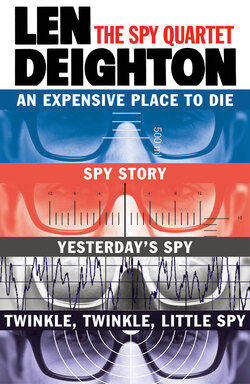Читать книгу The Spy Quartet - Len Deighton - Страница 17
На сайте Литреса книга снята с продажи.
6
ОглавлениеMaria Chauvet was thirty-two years old. She had kept her looks, her gentleness, her figure, her sexual optimism, her respect for men’s cleverness, her domestication. She had lost her girlhood friends, her shyness, her literary aspirations, her obsession with clothes and her husband. It was a fair swop, she decided. Time had given her a greater measure of independence. She looked around the art gallery without seeing even one person that she really desired to see again. And yet they were her people: the ones she had known since her early twenties, the people who shared her tastes in cinema, travel, sport and books. Now she no longer wished to hear their opinions about the things she enjoyed and she only slightly wished to hear their opinions about the things she hated. The paintings here were awful, they didn’t even show a childish exuberance; they were old, jaded and sad. She hated things that were too real. Ageing was real; as things grew older they became more real, and although age wasn’t something she dreaded she didn’t want to hurry in that direction.
Maria hoped that Loiseau wasn’t going to be violent with the Englishman that he had taken away. Ten years ago she would have said something to Loiseau, but now she had learned discretion, and discretion had become more and more vital in Paris. So had violence, come to that. Maria concentrated on what the artist was saying to her. ‘… the relationships between the spirit of man and the material things with which he surrounds himself …’
Maria had a slight feeling of claustrophobia; she also had a headache. She should take an aspirin, and yet she didn’t, even though she knew it would relieve the pain. As a child she had complained of pain and her mother had said that a woman’s life is accompanied by constant pain. That’s what it’s like to be a woman, her mother had said, to know an ache or a pain all day, every day. Her mother had found some sort of stoic satisfaction in that statement, but the prospect had terrified Maria. It still terrified her and she was determined to disbelieve it. She tried to disregard all pains, as though by acknowledging them she might confess her feminine frailty. She wouldn’t take an aspirin.
She thought of her ten-year-old son. He was living with her mother in Flanders. It was not good for the child to spend a lot of time with elderly people. It was just a temporary measure and yet all the time he was there she felt vaguely guilty about going out to dinner or the cinema, or even evenings like this.
‘Take that painting near the door,’ said the artist. ‘“Holocaust quo vadis?” There you have the vulture that represents the ethereal and …’
Maria had had enough of him. He was a ridiculous fool; she decided to leave. The crowd had become more static now and that always increased her claustrophobia, as did people in the Métro standing motionless. She looked at his flabby face and his eyes, greedy and scavenging for admiration among this crowd who admired only themselves. ‘I’m going now,’ she said. ‘I’m sure the show will be a big success.’
‘Wait a moment,’ he called, but she had timed her escape to coincide with a gap in the crush and she was through the emergency exit, across the cour and away. He didn’t follow her. He probably already had his eye on some other woman who could become interested in art for a couple of weeks.
Maria loved her car, not sinfully, but proudly. She looked after it and drove it well. It wasn’t far to the rue des Saussaies. She positioned the car by the side of the Ministry of the Interior. That was the exit they used at night. She hoped Loiseau wouldn’t keep him there too long. This area near the Élysée Palace was alive with patrols and huge Berliot buses, full of armed cops, the motors running all night in spite of the price of petrol. They wouldn’t do anything to her, of course, but their presence made her uncomfortable. She looked at her wristwatch. Fifteen minutes the Englishman had been there. Now, the sentry was looking back into the courtyard. This must be him. She flashed the headlights of the E-type. Exactly on time; just as Loiseau had told her.
